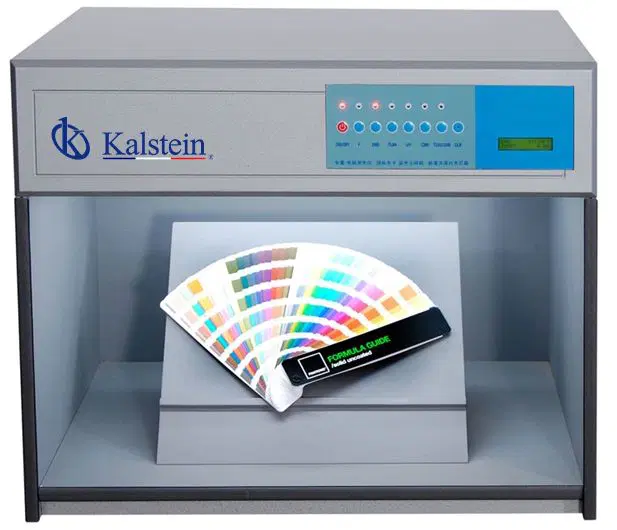The Standard Color Evaluation Box YR05531 is a specialized device designed for the precise evaluation and comparison of color in different samples. Its use is essential in industries such as textiles, paints, plastics, and food, where color is a crucial factor in the quality of the final product. This evaluation box is equipped with multiple lighting configurations that allow users to observe color under various lighting conditions, ensuring that samples meet the required standards.
Technical Specifications
Below are the technical specifications for the Standard Color Evaluation Box YR05531:
| Model | YR05531 |
| Project | parameters |
| Configuration | F, D65, TL84, UV, CWF/TL83, A in Total Six Light Sources |
| Weight | 28Kg |
| Size(L*W*H) | 71 0x530x570 mm |
| Optional Accessory | Light source diffuser, 45 degree standard stand |
Light source
| Type | Color Temperature | Power |
| D65 International standard Artificial Daylight | 6500K | 18W |
| TL84 Applied to stores in Europe, Japan and China | 4000K | 18W |
| CWF (Cool White Fluorescent) American Standard | 4150K | 18W |
| F “Sun-setting Light Yellow” incandescent light source (imitation of sunset) |
2700K | 40w |
| UV Viewing under ultraviolet light to detect and evaluate optical brighteners or fluorescent pigments |
365mm | 18w |
| A American shopwindow spotlight | 2856K | 60w |
| TL83 Warm White Fluorescent European Standard | 3000K | 18w |
Market Price
Regarding price, the Standard Color Evaluation Box YR05531 falls within a competitive range, generally ranging from $1,500 to $3,000. This price range may vary depending on the distributor and additional features included, such as optional accessories. Investing in this equipment is crucial for companies seeking to enhance the quality and consistency of their products through rigorous color control.
Frequently Asked Questions
What types of samples can I evaluate with the color evaluation box?
You can evaluate a variety of samples, including textiles, paints, plastics, and food, making it very versatile.
How is the color evaluation box used?
Simply place the sample on the platform, select the desired light source, and observe the results. The different light configurations will help you see how the color changes under various conditions.
Does the evaluation box require calibration?
Yes, it is recommended to calibrate the box regularly to ensure accurate color evaluations.
Is it difficult to use?
No, the box is designed to be intuitive and easy to use, even for those without prior experience.
Does it come with a warranty?
Yes, KALSTEIN offers a standard warranty of 1 to 2 years covering manufacturing and operational defects.
Where can I purchase the YR05531 Color Evaluation Box?
You can purchase it directly through Kalstein’s website, where you can also request a quote.
Advantages and Disadvantages of the Color Evaluation Box
|
Advantages |
Disadvantages |
|
Allows precise color evaluation |
Higher initial cost compared to other lower-quality options |
|
Multiple lighting configurations |
Requires some time for calibration |
|
Robust and durable design |
Can be cumbersome for small spaces |
|
Easy to use |
Certain lamps need to be replaced regularly |
|
Ensures color consistency |
Absence of advanced analysis software |
|
Ideal for various applications in the industry |
Weight may make transport difficult |
|
Specialized technical support available |
Limited availability in some regions |
Benefits of Using This Color Evaluation Box
Using the Standard Color Evaluation Box YR05531 brings numerous benefits that can positively impact the quality of the final product. Firstly, it allows for precise color evaluations under different lighting conditions, which is essential for maintaining uniformity and quality in manufactured products. This is particularly important in the textile and paint industries, where color can affect customer perception and product acceptance.
Additionally, the device is fundamental for quality control, as it helps detect color discrepancies that may arise during the production process. The ability to compare the sample color with established standards ensures that products meet customer expectations and industry regulations. This not only enhances customer satisfaction but can also reduce waste and costs associated with non-compliant products.
Use of the Product in the Field
In the field, the Standard Color Evaluation Box YR05531 is used by quality control laboratories, textile factories, paint companies, and in the food sector to evaluate product appearance. For example, in the textile industry, it is used to verify that fabric colors match approved samples, ensuring that the final product is exactly what the customer requested. Similarly, in the paint industry, it is used to ensure that the color of paint in cans matches the desired color before it goes to market.
The use of this evaluation box also extends to research laboratories studying the optical properties of different materials. Researchers can use the device to obtain precise data on light absorption and reflection at different wavelengths, which is critical for their studies.
Recommendations
To maximize the use and durability of the Standard Color Evaluation Box YR05531, it is recommended to follow the manufacturer’s instructions regarding maintenance and calibration of the equipment. Ensure that periodic calibrations are performed to guarantee the accuracy of measurements. It is also advisable to train the staff who will use the box, ensuring they are familiar with its operation and maintenance.
For those interested in acquiring this model, I invite you to visit the Kalstein Plus platform, where you can request a quote or generate one automatically. Don’t wait any longer to improve your laboratory with high-quality equipment. Visit https://kalstein.net/en/product/standard-color-light-box-yr05531/ and explore all the available options to optimize your processes with this evaluation box. https://kalstein.net/en/
Investing in a Standard Color Evaluation Box YR05531 is not just an upgrade for your laboratory; it’s a step toward innovation and precision.


